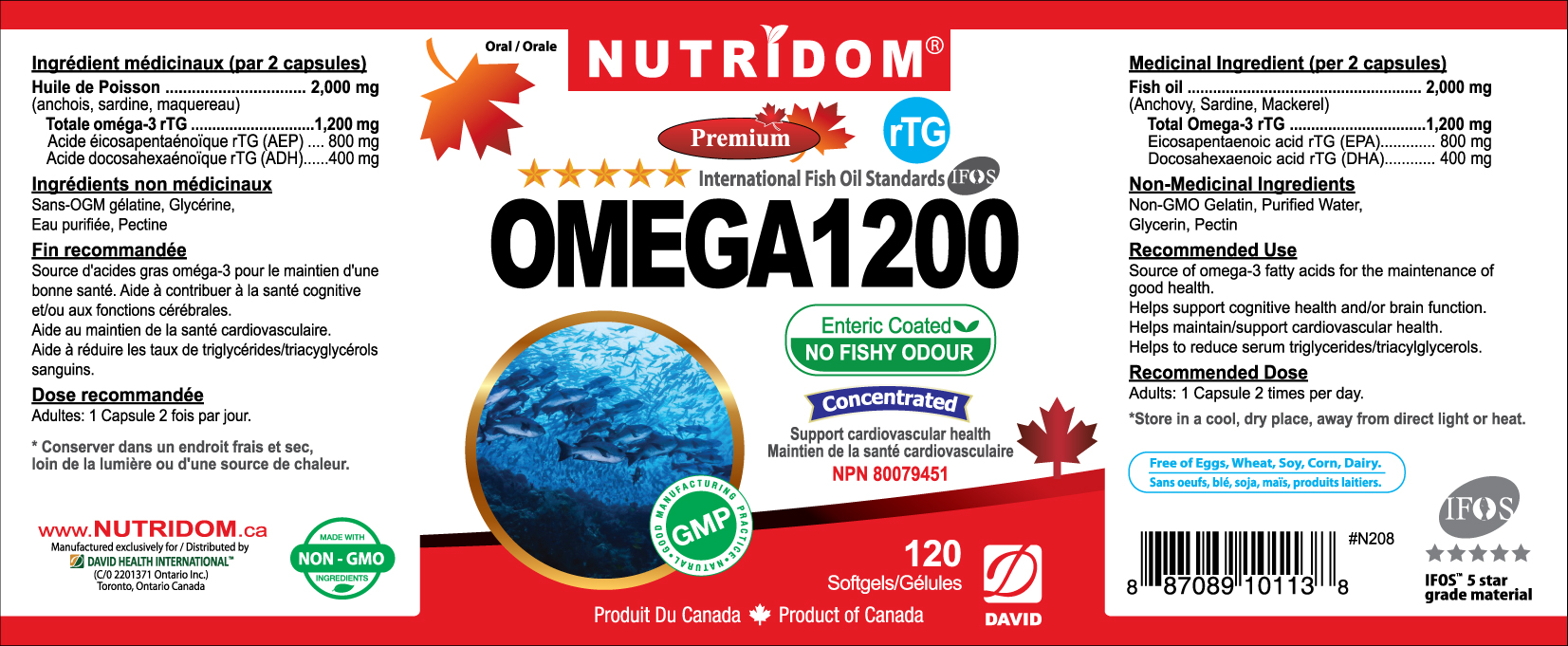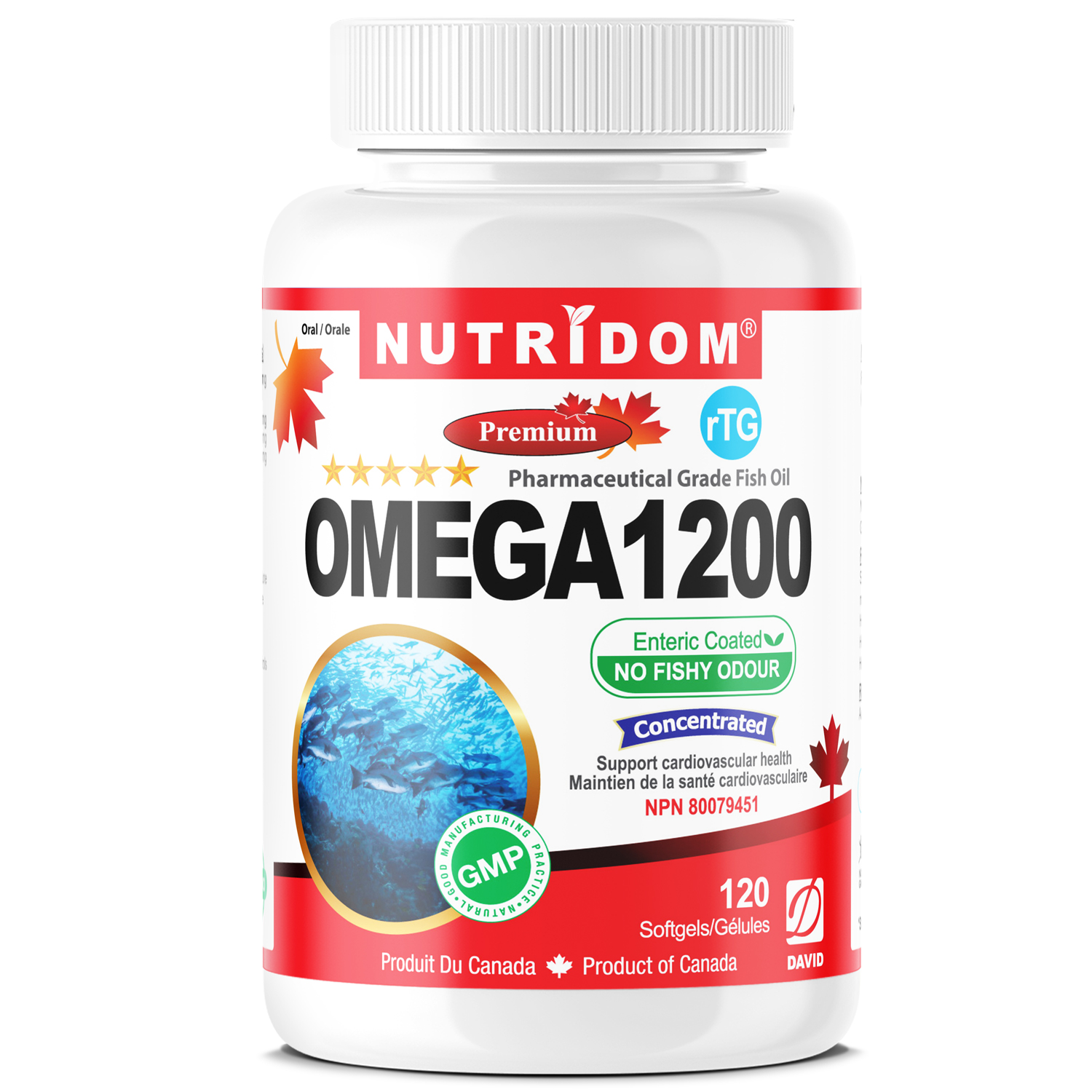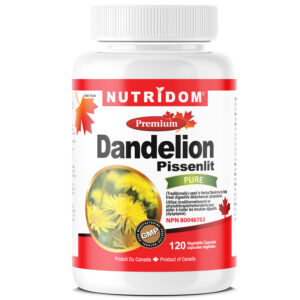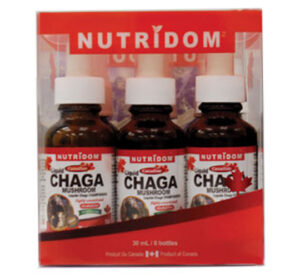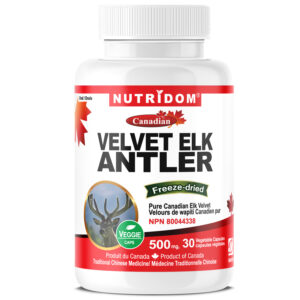Nutridom Omega 1200 (rTG Omega 3) 120 Softgels
$0.00
– Fish oil (Anchovy, Mackerel, Sardine) containing 800mg EPA and 400mg DHA per day
– Excellent source of omega-3 essential fatty acids EPA and DHA.
– Enteric coating to combat problems with a fishy aftertaste or fishy burps.
– Maintain/support cardiovascular health.
– Help reduce blood triglycerides.
– Re-esterified TG (rTG) for superior absorption.
– NPN: 80079451.
PRODUCT RESEARCH / SAFETY
Fish Oil and Omega-3
Fish oil is an excellent source of the long chain omega-3 fatty acids, eicosapentaenoic acid (EPA) and docosahexaenoic acid (DHA). The oil is extracted from cold water fish such as anchovy, sardine, and mackerel, which are some of the best natural sources of uncontaminated EPA and DHA. Their oils are scientifically recognized for their cardiovascular benefits, such as reducing “bad” cholesterol (LDL) and lowering blood pressure.
DHA (Docosahexaenoic acid)
DHA is docosahexaenoic acid which like EPA is usually found in marine oils and consists of a 22-carbon chain with 6 double bonds. While DHA appears to be an important structural component of all body organs and it is the most abundant omega 3 found in cell membranes, the brain and eyes. Its presence in the cell membrane contributes to maintaining its fluidity or the ability of things to pass and out of the cell.
DHA is an essential fatty acid in brain, nerve and eye tissue, being critically important during development of infant for proper visual acuity and motor skills.
EPA (Eicosapentaenoic acid)
EPA stands for eicosapentaenoic acid which is usually found in marine oils as algae and phytoplankton are good sources of EPA. It is a chain of 20 carbons with 5 bonds and as mentioned before as with all omega 3 oils, the first double bond is located at the third carbon. EPA is always being used by the body and thus needs to be replaced often. It is not as abundant in a structural sense as DHA but has become apparent in research that it is the most important when considering its role in decreasing inflammation which is integral to so many health conditions.
EPA reduces inflammation and blood clots within the cardiovascular system. Also, it plays anti-inflammatory effect, protecting body from Rheumatoid arthritis and other inflammatory diseases such as asthma and multiple sclerosis.
Fish Oil Omega-3s: Triglyceride (TG) vs. Ethyl Esters (EE)
Triglycerides are made of three fatty acids attached to glycerol and occur naturally in nature. Ethyl esters are made up of one fatty acid attached to an ethanol molecule are created synthetically by a process called trans-esterification. This involves the removal of the glycerol backbone from triglyceride (TG) and then attaching an ethanol molecule to each of the 3 free fatty acids released from the glycerol. The resulting ethyl ester (EE) form allows for concentrating EPA and DHA at a lower temperature.
Many fish oil supplements are sold in this form. Some companies choose to re-esterify the EE form back to its TG form which are identical to natural triglycerides but with higher concentration of EPA and DHA. This is a costly process which is why re-esterified triglyceride form supplements will be more expensive.
REFERENCES
- Albert CM, Campos H, Stampfer MJ, Ridker PM, Manson JE, Willett WC, Ma J. Blood levels of long-chain n-3 fatty acids and the risk of sudden death. N Engl J Med. 2002 Apr 11;346(15):1113-8.
- León H, Shibata MC, Sivakumaran S, Dorgan M, Chatterley T, Tsuyuki RT. Effect of fish oil on arrhythmias and mortality: systematic review. BMJ. 2008 Dec 23;337:a2931.
- Messamore E, Almeida DM, Jandacek RJ, McNamara RK. Polyunsaturated fatty acids and recurrent mood disorders: Phenomenology, mechanisms, and clinical application. Prog Lipid Res. 2017 Jan 6;66:1-13.
- Thomas J, Thomas CJ, Radcliffe J, Itsiopoulos C. Omega-3 Fatty Acids in Early Prevention of Inflammatory Neurodegenerative Disease: A Focus on Alzheimer’s Disease. Biomed Res Int. 2015;2015:172801.
- Schuchardt JP, Schneider I, Meyer H, Neubronner J, von Schacky C, Hahn A. Incorporation of EPA and DHA into plasma phospholipids in response to different omega-3 fatty acid formulations–a comparative bioavailability study of fish oil vs. krill oil. Lipids Health Dis. 2011 Aug 22;10:145.
- De Caterina R. n-3 fatty acids in cardiovascular disease. N Engl J Med. 2011 Jun 23;364(25):2439-50.
This page is not intended to be a comprehensive review of the medicinal ingredient.
SUPPLEMENT FACTS
